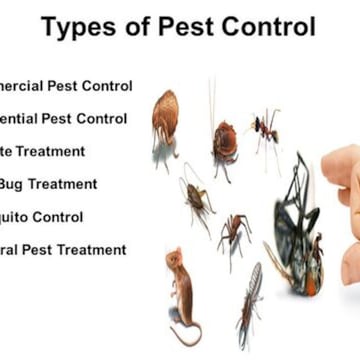9 Simple Techniques For Pest Control
9 Simple Techniques For Pest Control
Blog Article
The smart Trick of Pest Control That Nobody is Talking About
Table of Contents5 Simple Techniques For Pest ControlSome Known Facts About Pest Control.Unknown Facts About Pest ControlThe 2-Minute Rule for Pest ControlPest Control Fundamentals Explained
Limitations of Chemical Management Be able to assess insect issues, identify if monitoring is needed, and make ideal referrals making use of IPM strategies. Be acquainted with different techniques of parasite administration - their benefits and limitations.This chapter discusses (IPM), an approach that uses knowledge about insects and their, methods, nonchemical methods, and pesticides to handle bug problems. Extra information regarding IPM for details plants is included in chapters that focus on those plants. Nonchemical pest control actions are worried in chapter 17, "Organic Gardening." Taking care of birds and animals is covered in phase 20, "Wildlife." Handling in the backyard and yard is covered in chapter 6, "Weeds." Insects in a yard or landscape may consist of insects and mites, weeds,, animals, and birds.
Many individuals rush to draw, hoe, or spray every weed they see. Pests and weeds, nonetheless, contribute in the. After growing a yard or establishing a lawn, the all-natural procedure of plant sequence starts to restore and nonnative plants. A weed growing in a lawn represents the first stage in a series of events that, if enabled to proceed, can at some point cause a woodland.
What we call "bugs" are part of an all-natural system at work. Just human beings consider particular types pests when they happen where they are not wanted.
Not known Details About Pest Control
Parasites vulnerable to a pesticide were promptly eliminated, leaving resistant ones to breed and multiply. It ended up being clear that chemicals alone would certainly not address all pest problems.
An IPM plan enables some degree of parasites in the environment. Pests are much less likely to survive a program that makes use of many different approaches of lowering their populaces. Integrated pest management was first recommended by entomologists due to the fact that pests were the initial team of parasites to confirm hard to take care of with chemicals alone.
parasite and host properly. and consider economic or visual injury. A limit is the factor at which activity ought to be taken. a treatment strategy using mechanical, cultural, organic, or chemical controls, or a mix of these methods. success of therapies. IPM has extended past insects to management of all pest populaces: weeds, condition microorganisms, and mammals.
The Basic Principles Of Pest Control
Monitoring instead of elimination of insects is the objective. An IPM plan starts with a cautious analysis of each pest problem. Only after that can one decide regarding the appropriate techniques necessary to subdue pest tasks. The life cycle of the bug, feasible damage, all-natural enemies, and impacts of climate, among other factors, are considered prior to a control strategy is executed - Pest Control.
Clover expanding in a grass may be seen as an undesirable weed, yet as a legume it is synthesizing nitrogen for the dirt and the blossoms are providing nectar to honey and various other. Tolerance for some weeds may become part of an IPM strategy. might be eating the leaves of a plant, however when they are recognized as the larvae of Eastern tiger swallowtail butterflies, their damages may be tolerated so we can delight in the lovely butterfly.

The 2nd most important tool in insect administration is very early treatment. Responding to problems quickly, before they have time to increase, needs a much less significant treatment.
The 9-Minute Rule for Pest Control
Lots of go to this website secure, practical, nonchemical techniques of plant protection and insect management may reduce or remove the demand to spray. Various other techniques are most helpful when made use of with chemicals. To apply monitoring methods properly and to reduce losses, garden enthusiasts need to understand the sorts of insects that strike plants and comprehend pest biology.

Carrying out a soil examination and using just the advised amount of plant food and lime makes the most of the benefit to the plant while lessening troubles related to excessive use of fertilizer - Pest Control. Covering the soil with a number of inches of mulch secures the plant in numerous means: reducing dirt water loss to dissipation, decreasing weed competition, providing nutrients, and creating a suitable environment for earthworms and microorganisms that keep the soil loose for roots and break down organic material to release nutrients
If mulch touches the trunk, it can produce a method for voles, germs, and fungi to attack the plant. Do not use manure or garden compost that has actually not completely broken that site down as a top clothing since it can motivate unfavorable insects. Research recommends that tilling the dirt is harmful to soil framework.
Not known Incorrect Statements About Pest Control
If tilling is considered necessary, think about doing it in the loss when the life why not try these out cycles of numerous parasites brings them near the surface. At the surface, bugs come to be exposed to the weather as well as birds and other all-natural adversaries.
Report this page